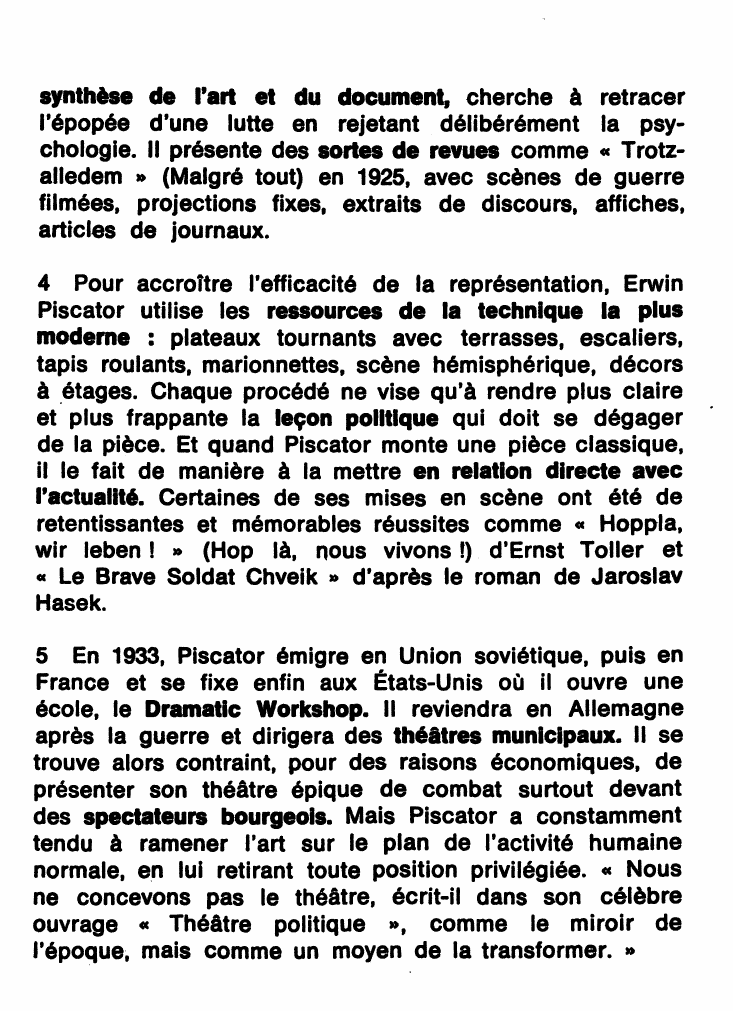PISCATOR, ERWIN
Publié le 26/12/2011

Extrait du document
PISCATOR, ERWIN (1893–1966), theater* director and playwright; best known for his concept of political theater. He was born in the village of Ulm, near Wetzlar, to a local pastor; the family soon moved to Marburg. In 1913 he began studies in art history and philosophy at Munich; however, he was soon drawn to the stage. In the summer of 1914 he acted as an extra with Munich's Hoftheater. Drafted in 1915, he was politicized by the war (he was wounded in 1917). In Berlin* by 1918, he joined the Dada* group (he was fast friends with George Grosz*) and entered the KPD early in 1919. After creating Košnigsberg's Theater Tribunal in 1919, he returned to Berlin to open his Proletarian Theater; less auditorium than group, the Proletarisches Theater performed propaganda pieces in meeting rooms and small halls. Shifting to mainstream production, he assumed direction of Berlin's Central-Theater in 1923–1924 and then directed the Volksbušhne during 1924–1927. He worked in these years with Bertolt Brecht,* Max Brod, Ernst Toller,* and Walter Mehring.* With his Piscator- Bušhnen (three separate companies), he devised elaborate sets; his best-known shows, mounted during 1927–1931, included Hoppla, wir leben!, Rasputin, Schweik, and Der Kaufmann von Berlin. His acclaimed book Das politische Theater (The political theater), published in 1929, is an autobiographical rendering of his work. Both Nazism and financial problems convinced Piscator to leave Germany in 1931. He went first to the Soviet Union,* where he made films* and led the International Revolutionary Theater Alliance, and then lived in Paris during 1936–1938. He sailed for New York in 1938 and began directing the drama workshop at the New School for Social Research in 1940. From 1962 until his death he was intendant at the Freie Volksbušhne in West Berlin. Above all else, Piscator aimed for ‘‘total theater,'' that is, an auditorium so equipped with technology and sophisticated concepts that he could expose the full potential of the stage.
«
Piscator (Erwin) 11s
SJftthèse de l'art et du document, cherche à retracer
l'épopée d'une lutte en rejetant délibérément la psy chologie.
Il présente des sortes de revues comme ..
Trotz alledem • (Malgré tout) en 1925, avec scènes de guerre filmées, projections fixes, extraits de discours, affiches,
articles de journaux.
4 Pour accroitre l'efficacité de la représentation, Erwin
Piscator utilise les ressources de la technique la plus moderne : plateaux tournants avec terrasses, escaliers, tapis roulants, marionnettes, scène hémisphérique, décors à étages.
Chaque procédé ne vise qu'à rendre plus claire
et plus frappante la leçon politique qui doit se dégager
de la pièce.
Et quand Plscator monte une pièce classique, il le fait de manière à la mettre en relation directe avec
l'actuaiHé.
Certaines de ses mises en scène ont été de
retentissantes et mémorables réussites comme " Hoppla,
wir leben 1 ..
(Hop là, nous vivons !) d'Ernst Toiler et " Le Brave Soldat Chveik " d'après le roman de Jaroslav
Hase k.
5 En 1933, Piscator émigre en Union soviétique, puis en France et se fixe enfin aux États-Unis où il ouvre une
école, le Dramatlc Workshop.
Il reviendra en Allemagne après la guerre et dirigera des théltres municipaux.
Il se
trouve alors contraint, pour des raisons économiques, de
présenter son théâtre épique de combat surtout devant
des spectateurs bourgeois.
Mais Piscator a constamment
tendu
à ramener l'art sur le plan de l'activité humaine
normale, en lui retirant toute position privilégiée.
" Nous
ne concevons pas le théâtre, écrit-il dans son célèbre
ouvrage " Théâtre politique "• comme le miroir de
l'époque, mais comme un moyen de la transformer.
"
.,..
Voir aussi : Meyerhold.
O'Casey, Stanislavski, Weiss..
»
↓↓↓ APERÇU DU DOCUMENT ↓↓↓
Liens utiles
- Piscator Erwin, 1893-1966, né à Ulm, metteur en scène allemand.
- Piscator, Erwin - encyclopédie du théâtre.
- PERSPECTIVE COMME FORME SYMBOLIQUE (LA), Erwin Panofsky - résumé de l'oeuvre
- ERWIN - Quatre dialogues sur le Beau et sur l'Art (résumé) de Karl Wiîhelm Ferdinand Solger
- CABANE SUR LE CHANTIER Erwin Guido Kolbenheyer (résumé)


